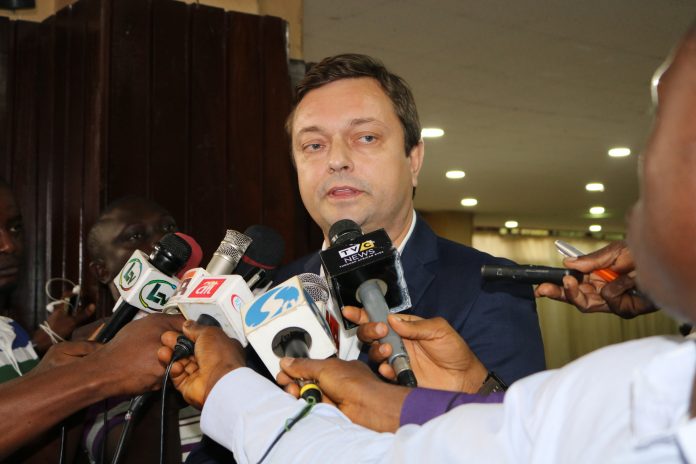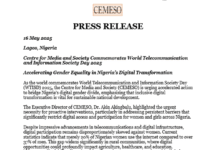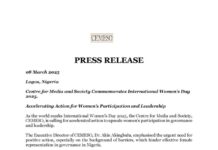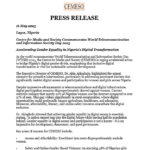The European Union (EU) ambassador to Nigeria, Ketil Karlsen, said yesterday that the organisation “stands firm on the principles of freedom of speech,” noting: “It is important in any democratic society for people to be able to participate.”
The declaration followed the granting of a prayer by the Department of State Services (DSS), which had approached the Federal High Court, Abuja seeking to detain Sowore, the presidential candidate of the African Action Congress in the last general elections, for 45 days.
Sowore, the founder of Sahara Reporters, has been in DSS custody following his arrest last Saturday over a call for mass action against alleged misgovernance by the President Muhammadu Buhari administration.
The DSS yesterday had sought an ex parte order in a motion (FHC/ABJ/CS/ 915/19) to hold the convener of #RevolutionNow, for an additional 90 days, pending the conclusion of its investigation.
Justice Taiwo O. Taiwo, however, granted 45 days, ruling that if the applicant requires more time thereafter, it could apply for a renewal.
This came after the judge had seen the evidence attached to the application of the DSS, one of which includes the video of an alleged conference between the respondent and the leader of the Indigenous People of Biafra (IPOB), Nnamdi Kanu, and further evidence that members of the recently proscribed Shiites group, Islamic Movement of Nigeria (IMN), would have joined in the mass action.
In a statement in Abuja, Karlsen said: “I am not aware of any petition following the latest events in Nigeria but what I can say is that as long as people seek peaceful means to demonstrate and voice their political opinion, this is what we see as a natural part of a thriving democracy.”
“Any democracy or any society in the world must jealously guard and make sure that such pronouncements are always non-violent and that they respect the fundamental rules of the game and democracy at the end of the day.”
Karlsen further clarified: “It is for the Nigerian justice system, in the end, to follow up on specific cases. And as long as these cases are being dealt with in the Nigerian justice system, it is not for the EU or the EU ambassador to judge what is right or wrong on these occasions.
“But of course, we always follow very carefully when there are dissenting voices in the countries where we operate and we listen very carefully to all of them.”
Socio-cultural groups, Afenifere, Ohanaeze Ndigbo, and a Senior Advocate of Nigeria, Mike Ozekhome, also condemned the detention order.
Afenifere, in a statement by its spokesman, Yinka Odumakin, said: “We are aware of that obnoxious provision in the Terrorism Act, but it can never assume superiority over the constitution, which stipulates that a citizen cannot be detained for more than 48 hours before being charged to court.
“Sowore was arrested before he could commit an offense and the Department of State Services (DSS) seems to want to go shopping for evidence to prosecute him.
“Having failed to allow him to commit the offense before he was peremptorily arrested, the DSS should free Sowore or charge him to court so the judicial process can take its course.
“Sowore is only being held illegally using the legal process. Our advice to the government is that it should understand and act in conformity with democratic tenets in dealing with the rights of Nigerians.”
Ohanaeze’s deputy national publicity secretary, Chuks Ibegbu, said the detention implied that the people’s right of expression as enshrined in the constitution was no longer guaranteed.
He warned: “We have to be careful on this matter because every Nigerian has the right to express his views on governance. What they call revolution is a peaceful protest. And when you say treason, you have to ask yourself what constitutes a treasonable felony. I believe it is subject to interpretation.
“As much as we are not encouraging violence, we feel his fundamental right is being abridged. This is because there are various dimensions to revolution. The government needs to understand the kind of revolution he is talking about whether it is political, economic or any other.
“But one thing you must know is that democracy guarantees people the opportunity to participate in governance. It should guarantee our ability to call the government to order in a manner that will not cause violence. So, the DSS should be careful not to go against the laws of the land in dealing with this matter at this critical period.”
Ozekhome described the detention as bad news for democracy and human rights especially because the application was made and granted ex parte, which means behind Sowore’s back.
He questioned why the judge failed to order the Federal Government, which is already holding Sowore to put him on notice. According to the constitutional lawyer, the court could also have ordered Sowore to show cause why he should not be detained for 45 days.
“What happens to the Court of Appeal decision in IGP V ANPP, where it was held that no Nigerian requires police permit to demonstrate and protest peacefully on the streets of Nigeria?
“To me, what all this boils down to is an intolerant government gravely and pathetically allergic to respect for and tolerance of criticism, the rule of law, individual fundamental rights, political choices, the plurality of voices, dissenting opinions and the independence of the judiciary,” Ozekhome said.
He added: “It is a complete farce and total ruse. God help Nigeria, even as the people should gird their loins for tougher days ahead. Nigerians should protest and demonstrate peacefully on Nigerian streets against the harsh and anti-people policies of this government. Not to do so is to cheaply capitulate to coercive intimidation and abdication of their sovereignty to their very elected and selected agents in government.”
In other reactions, Lagos-based lawyer and human rights activist, Inibehe Effiong, said: “Our position remains that the DSS has no case of treason or treasonable felony against Sowore. This is a fictional case created by an intolerant regime to suppress dissenting voices. The Buhari administration is trying to use someone to send a message to Nigerians to shut up and not speak out about the ills of this administration.”
Stephen Azubuike, also a lawyer, explained that under Nigerian law, the investigation ought to precede arrest, followed by detention and eventual trial of an accused person based on the filing of a charge before a competent court of law.
Querying the ex parte order, he said the law requires that a motion on the notice must accompany the application to be served on Sowore. This, he said, would give him the opportunity to be heard on the merit or otherwise of his continued detention pending investigation.
The convener of Access to Justice, Joseph Otti, corroborated Azubuike’s view, saying: “The court order granting the DSS a 45-day period to hold Sowore unfortunately and unfairly extends and legitimises the government’s abuse of civil rights in Nigeria. Although the court made the order exercising its powers under the Terrorism Act, the Act itself is subject to the constitution and not above it. A court of law is obligated to treat the constitution and the protections afforded by it as superior to other legislation, with limited exceptions.
“What the court has ultimately done is to embolden the government’s tactic of using the Terrorism Act to suppress civil dissent and curtail the ability of civil society to express its grievances freely and legitimately.”
















